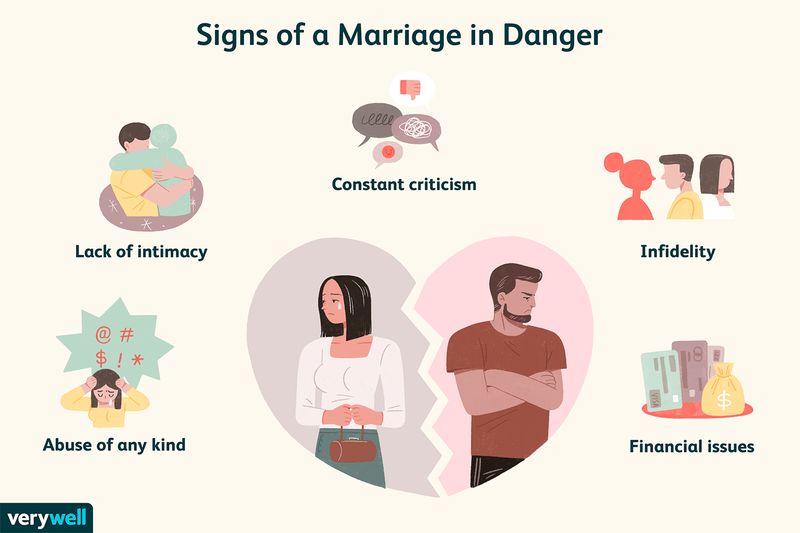Marriage can be a beautiful journey shared between two people, but sometimes it faces challenges that may hint at its impending end. Recognizing these signs early can be crucial in addressing underlying issues that might otherwise lead to the dissolution of the relationship. In this blog post, we explore 18 specific behaviors that could signal your marriage is in trouble. These signs range from communication breakdowns to subtle changes in affection and respect. By being aware of these behaviors, couples can take proactive steps to reignite their connection or seek help before it’s too late.
1. Lack of Communication

Communication is the cornerstone of any successful marriage. When spouses stop talking, or worse, only engage in arguments, it signals a deeper issue. A lack of communication can create misunderstandings and resentment, leading to isolation.
Imagine sitting across from your partner, enveloped in silence, the clink of cutlery the only sound. This silence speaks volumes, often louder than words. Maybe the silence is born from unresolved conflicts or unmet expectations. Whatever the cause, this void can erode intimacy, making it difficult to bridge the emotional gap.
2. Increased Criticism

Criticism, when constructive, can be beneficial. However, persistent, harsh criticism can harm a marriage. It often begins subtly, with minor grievances, but can escalate into relentless fault-finding.
Imagine feeling like every action is under scrutiny. This constant negativity not only affects self-esteem but also breeds resentment. It can turn a loving partnership into a battlefield where affection is replaced by hostility. The relentless quest for flaws can signify deeper dissatisfaction, potentially leading to emotional withdrawal.
3. Emotional Withdrawal

Emotional withdrawal can be likened to a storm cloud drifting over a once sunny relationship. This behavior often manifests as a partner becoming increasingly distant, both physically and emotionally.
The warmth of shared moments fades, replaced by a chilling silence. When hugs, smiles, and conversations dwindle, it may signal that one partner is pulling away. This retreat can stem from unresolved conflicts or personal struggles, marking a crucial moment for intervention before the emotional gulf becomes too wide.
4. Lack of Intimacy

Intimacy, both emotional and physical, is vital in a marriage. Its absence can be a red flag. As intimacy wanes, so does the closeness between partners, often leaving a void filled with loneliness.
Imagine sharing a bed yet feeling miles apart. The physical barrier mirrors the emotional distance, marking a shift from once intimate moments. Whether due to stress, health issues, or emotional disconnect, a lack of intimacy can signify a relationship in distress, urging for a renewed effort to reconnect.
5. Constant Fighting

Arguments in marriages are normal, but when they become a constant, it’s concerning. Frequent disputes can overshadow positive interactions, leading to exhaustion and resentment.
Think of a home filled not with laughter, but with raised voices and tension. This environment can suffocate love, replacing it with a battleground of unresolved issues. Over time, this constant friction can wear down the relationship, making reconciliation seem like an insurmountable task, pushing partners further apart.
6. Avoidance

Avoidance is a subtle yet powerful indicator that something is amiss in a marriage. This behavior might manifest as avoiding conversations, activities, or even physical presence with a partner.
Imagine living in a shared space yet feeling like distant roommates. This avoidance creates a chasm, widening the emotional distance. It might stem from fear of confrontation or simply a lack of interest. Left unchecked, it can signify a drift towards emotional isolation, urging immediate attention to bridge the gap.
7. Secretive Behavior

When one partner begins to act secretively, it can signal underlying issues. Whether it’s hidden phone conversations, secretive finances, or undisclosed outings, this behavior breeds suspicion.
Imagine the anxiety of wondering what your partner might be hiding. This secrecy erodes trust, a fundamental pillar of any relationship. The shadows of doubt it casts can create a wedge, leading to paranoia and insecurity. Addressing and understanding the cause is crucial to restoring transparency and rebuilding trust.
8. Lack of Support

Support is vital in marriage. When one partner no longer feels the other’s support, it can be disheartening. Whether it’s career achievements or personal struggles, feeling unsupported can create a rift.
Imagine achieving a milestone, yet feeling alone in your celebration. This lack of enthusiasm from your partner can lead to feelings of isolation. Such behavior may suggest underlying jealousy or disengagement, highlighting a need to restore mutual support and encouragement within the relationship.
9. Financial Problems

Financial stress can strain even the strongest marriages. Money issues often lead to arguments, creating tension and blame games.
Picture a table covered in bills, the air thick with stress and frustration. Financial woes can lead to sleepless nights and endless arguments, overshadowing the joys of marriage. This stress can chip away at trust and stability, urging couples to communicate openly about finances and seek solutions together.
10. Infidelity

Infidelity is a betrayal that often signals a deep-rooted problem in a marriage. This breach of trust can be devastating, leaving partners questioning their relationship’s foundation.
Imagine the heartache of discovering a partner’s infidelity. This revelation can shatter trust, leaving emotional scars. The path to healing is fraught with challenges, requiring transparency, forgiveness, and time. Infidelity often indicates unmet needs or dissatisfaction, highlighting urgent areas for communication and reconciliation.
11. Growing Apart

Growing apart can occur gradually, often unnoticed until the distance becomes a chasm. Life changes, evolving interests, or personal growth can lead to partners drifting.
Picture walking together, only to find yourselves on separate paths. This divergence can create loneliness where once there was companionship. Recognizing this drift is crucial to re-align goals and interests, ensuring the relationship evolves together rather than apart.
12. Lack of Appreciation

Appreciation is a fundamental aspect of a healthy marriage. When one partner feels undervalued, it can lead to resentment.
Imagine putting effort into something meaningful, only to be met with indifference. This lack of recognition can erode self-worth and happiness within the relationship. Reviving appreciation requires conscious effort, acknowledging each other’s contributions and rekindling the sense of value and admiration.
13. Unresolved Conflicts

Conflicts are inevitable in relationships, but leaving them unresolved can lead to lingering resentment. Unresolved issues can fester, creating an undercurrent of hostility.
Picture a living room filled with silence, the air tense with unresolved disputes. These lingering issues can become barriers to intimacy and understanding, eroding the relationship’s foundation. Resolving conflicts requires open dialogue and compromise, fostering a healthier environment for growth.
14. Frequent Comparisons

Constant comparisons to others can damage self-esteem and the perception of the relationship. This behavior can lead to feelings of inadequacy and resentment.
Imagine being compared to someone else’s success or traits, feeling like you never measure up. Such comparisons can create insecurity, overshadowing unique qualities and strengths. Encouraging individuality and celebrating personal achievements is crucial to maintaining a supportive and loving environment.
15. Disregard for Boundaries

Respecting personal boundaries is essential for any relationship. When boundaries are ignored, it can lead to discomfort and loss of trust.
Imagine a situation where your personal space or privacy is continuously invaded. This disregard can create tension, eroding trust and comfort within the relationship. Establishing and respecting boundaries is vital to ensure mutual respect and a balanced partnership.
16. Loss of Shared Goals

Shared goals provide direction in a marriage. When partners no longer share aspirations, it can lead to confusion and disconnection.
Imagine embarking on a journey, only to find your destinations have diverged. This lack of shared vision can create a sense of aimlessness, impacting the relationship’s trajectory. Re-establishing common goals is essential to ensure both partners feel aligned and motivated in their shared future.
17. Neglecting Each Other

Neglect can creep into a marriage, often unnoticed. When partners prioritize other aspects of life over each other, it can signal trouble.
Picture a dinner where the only engagement is with screens, not each other. This neglect, whether intentional or not, can erode connection and intimacy. Reaffirming commitment through intentional time and attention is crucial to nurturing the relationship.

Mother of three and a primary school teacher. I’ve always loved being around children and helping them, so I chose my path as a teacher. It is sometimes hectic with three children, but I am 100 percent into it and wouldn’t change it for anything in the world.

